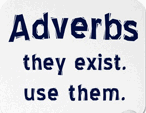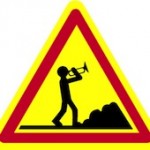|
|

English has several forms which express future events. The form we choose depends on how sure we are that something will happen, whether we want something to happen, or whether we are talking about ourselves or others. ASPECT is much more important than TIME.
⇒Predictions/Statements of fact/Intentions/Arrangements/Scheduled events⇐
[…]

¤ ACTIVE & PASSIVE TENSES CHART… ⇒ [01] ⇔ [02] ⇐
We find an overabundance of the passive voice in sentences created by self-protective business interests, magniloquent educators, and bombastic military writers (who must get weary of this accusation), who use the passive voice to avoid responsibility for actions taken.
Thus «Cigarette ads were […]

Determiners are grammar words which come in front of nouns.
•→https://eslgrammar.org/determiner/⇐
Click icon to open a chart with the correct collocations of such words →
Pay attention to the kinds of nouns they go with: countable (singular? plural?) or uncountable?
∞ Quantifiers: ⇓ (a) few, (a) little…
•→Quantifiers: fill in the gaps⇐
•→Determiners […]

∴
A →quantifier ← is a type of determiner, such as all or many, that indicates quantity.
These items have been argued to correspond to logical quantifiers at the semantic level.
Some Notes on Quantifiers ⇓ [http://grammar.ccc.commnet.edu]
Like articles, quantifiers are words that precede […]

A reporting verb is a word which is used to talk about or report on other people’s work. Reporting verbs can be used to great effect, but the difficulty with using them is that there are many, and each of them has a slightly different and often subtle meaning. . […]

¤ FOR + -ing versus TO-infinitive ← ¤ Clauses of purpose
We use clauses of purpose to talk about people’s purposes, the reasons why they do things.
⇒ [quiz 01] ⇔ [quiz 02] ⇔ [quiz 03]⇐
⊗ The infinitive of purpose
The infinitive of purpose can only be used when […]

Two or more words that have the same sound or spelling but differ in meaning ⇑ are homonyms.
Generally, the term homonym refers both to homophones: words that are pronounced the same but have different meanings, such as ‘row’ (Sp “remar”) and ‘row’ (Sp “fila”) and to homographs (words that […]

¤ Adverbs_of time ⇔ [quiz] ⇐
¤ Adverbs of frequency ↓ Position . . .
… always, usually, regularly, normally, often, sometimes, occasionally, rarely, seldom, hardly ever, never . . .
• before the main verb
Adverb of frequency Verb I always get up at 6.45. Peter can usually play football on […]

Prepositions ↑ from David Nicholson
‘ AT’ – ‘ON’ – ‘IN’
All these prepositions are used with expressions of both, time and place. Click below for collocations
•→ Prepositions of TIME ⇐
Notice we tend to use ‘at‘ with clock times and […]

•→ Frequently used Phrasal Verbs ⇐
Many words evoke spontaneous images in the minds of native speakers. This is particularly true of words which refer to physical, spacial events or relationships, e.g. go, jump, up, round. We are in direct contact with the physical world through our senses : seeing, feeling, hearing, tasting, […]

• Idioms galore in alphabetical order…⇒[01] ⇔ [02] ⇔[03] ⇔ [04] ⇔[05]⇐
⇓ •→ 10 Common English Idioms: Explained←
♦ Ten more ⇓
♦ Six expressions that bother ↓ Apparently Ashley
‘easy as pie’ / ‘expect the unexpected’ / ‘The customer is always right’ […]

• Vocabulary . . . →[01]← / →[02]← / →[03]← // ⇒[quiz]⇐
Picture dictionaries . . . ⇒[01] ⇔ [02]⇐
¤ Patterns & structures ↓ «What’s the weather like?»
When we talk about the weather, at a very basic level, we can follow any of these patterns:
• It is […]

• Vocabulary … [01] ⇔ [02] ⇔ [vid] ⇔ [vidquiz]⇐
•→Body movements←
A-K ⇐… Sports illustrated …⇒ L-Z
• Quizzes: →[01]← / →[02]←
∞ Guessing Game⇐[pairwork sports worksheet]
¤ Extreme sports⇐
Sports classified as […]

⇒ Telephone English ⇐
∴ Telephone Language
∴ Phoning a company: ⇒[01] ⇔ [02] ⇐
∴ Leaving a Message on an Answering Machine⇐
∴ Saying telephone numbers ⇐
∴ Spelling addresses ⇐
Φ Quizzes … ⇒[01] ⇔ [02] ⇔ [03] ⇐
marzo 8th, 2015 | Tags: tips, quiz | Category: FunctionaLang |

A comprehensive Powerpoint presentation on all conditional structures.
Notice there’s an omission near the end (count no. 6:14)
The subject’s missing from the last example (i.e. subject pronoun «I»); ‘mixed conditionals’:
Wish + Past Participle → I wish I hadn’t drunk so much ←
Remember to pause the player when […]

Auxiliary, or helping verbs, are used before infinitives to add a different meaning. The following auxiliaries are called ⇒Modal Auxiliaries or Modals⇐
Modal Auxiliaries Meanings / Functions can ability, permission, request, possibility could ability, formal request, possibility shall futurity, willingness, intention, suggestion, insistence should obligation, necessity, expectation, advisability will willingness, intention, prediction, […]

⊕ Telling the Time ⇐ / ⊗ Asking for the time ⇐
⇒words-about-time⇐ [www.english-at-home.com] ⇒time-expressions-in-english⇐
¤ Expressions of Time … ⇑ TASK (advanced)
•→Time markers associated to tenses⇐
Φ Time collocations ⇔ [quiz] ⇔ Time expressions⇐ Φ IT’S (HIGH) TIME + PAST SUBJUNCTIVE […]

• Survival English for Travelers …⇒ [01] ⇔[02]⇐
· · · Common words and phrases
¤ QUIZZES ⇐… [definitions]
• AT THE AIRPORT: Looking for the check-in desk← • At the check-in desk: ⇒[01] ⇔ [02]⇐ →What’s wrong? Questions and answers←
marzo 4th, 2015 | Tags: quiz | Category: FunctionaLang |

•→ Safety at Work ⇐
10 ‘WORK’ Expressions in English ↓
‘overworked’ / ‘dirty work’ / ‘get worked up’ / ‘work out’ / ‘ work on’ / ‘ work up an appetite’ / ‘workaholic’ / ‘work it’ / ‘work … in’ / ‘work something out’
• Employment & Jobs vocabulary … […]

¤ Pictionaries . . . ⇒[01]⇐ / ⇒[02]⇐
• Money Idioms . . . ⇒[01] ⇔ [02] ⇔ [03]⇐ Be closed-fisted : To be very stingy. Be pressed for money : To be very rich. Be rolling in money : When you have a lot of money. Live on a shoe string : […]
|
|



















